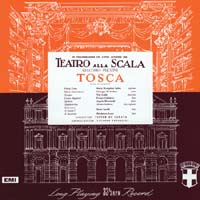
Tosca is an opera in three acts by Giacomo Puccini to an Italian libretto by Luigi Illica and Giuseppe Giacosa. It premiered at the Teatro Costanzi in Rome on 14 January 1900. The work, based on Victorien Sardou's 1887 French-language dramatic play, La Tosca, is a melodramatic piece set in Rome in June 1800, with the Kingdom of Naples's control of Rome threatened by Napoleon's invasion of Italy. It contains depictions of torture, murder, and suicide, as well as some of Puccini's best-known lyrical arias.

Maria Callas was an American-born Greek soprano and one of the most renowned and influential opera singers of the 20th century. Many critics praised her bel canto technique, wide-ranging voice and dramatic interpretations. Her repertoire ranged from classical opera seria to the bel canto operas of Donizetti, Bellini, and Rossini, and further to the works of Verdi and Puccini, and in her early career to the music dramas of Wagner. Her musical and dramatic talents led to her being hailed as La Divina.

Franco Corelli was an Italian tenor who had a major international opera career between 1951 and 1976. Associated in particular with the spinto and dramatic tenor roles of the Italian repertory, he was celebrated universally for his powerhouse voice, electrifying top notes, clear timbre, passionate singing and remarkable performances. Dubbed the "prince of tenors", audiences were enchanted by his handsome features and charismatic stage presence. He had a long and fruitful partnership with the Metropolitan Opera in New York City between 1961 and 1975. He also appeared on the stages of most of the major opera houses in Europe and with opera companies throughout North America.

Renata Tebaldi was an Italian lirico-spinto soprano popular in the post-war period, and especially prominent as one of the stars of La Scala, San Carlo and, especially, the Metropolitan Opera. Often considered among the great opera singers of the 20th century, she focused primarily on the verismo roles of the lyric and dramatic repertoires. Italian conductor Arturo Toscanini called her voice "la voce d'angelo", and La Scala music director Riccardo Muti called her "one of the greatest performers with one of the most extraordinary voices in the field of opera."
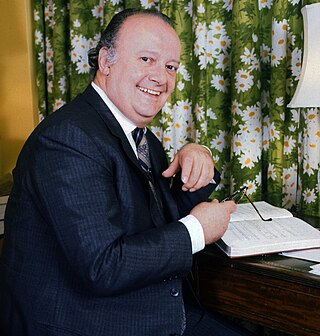
Tito Gobbi was an Italian operatic baritone with an international reputation.
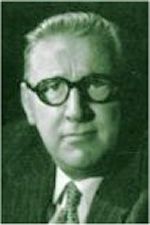
Harry Walter Legge was an English classical music record producer, most especially associated with EMI. His recordings include many sets later regarded as classics and reissued by EMI as "Great Recordings of the Century". He worked in the recording industry from 1927, combining this with the post of junior music critic of The Manchester Guardian. He was assistant to Sir Thomas Beecham at the Royal Opera House, Covent Garden, and in World War II played a role in bringing music to the armed forces and civilians.

Giuseppe Di Stefano was an Italian operatic tenor who sang professionally from the mid-1940s until the early 1990s. Called "Pippo" by both fans and friends, he was known as the "Golden Voice" or "The Most Beautiful Voice", as the true successor of Beniamino Gigli. Luciano Pavarotti said he modeled himself after Di Stefano. In an interview Pavarotti said "Di Stefano is my idol. There is a solar voice...It was the most incredible, open voice you could hear. The musicality of Di Stefano is as natural and beautiful as the voice is phenomenal". Di Stefano was also the tenor who most inspired José Carreras. He died on 3 March 2008 as a result of injuries from an attack by unknown assailants.

Victor Alberto de Sabata was an Italian conductor and composer. He is widely recognized as one of the most distinguished operatic conductors of the twentieth century, especially for his Verdi, Puccini and Wagner.

Tullio Serafin was an Italian conductor and former Musical Director at La Scala.

Eberhard Freiherr von Waechter was an Austrian lyric baritone, celebrated for his performances in the operas of Mozart, Richard Wagner and Richard Strauss. After retiring from singing, he became intendant of the Vienna Volksoper and the Vienna State Opera.
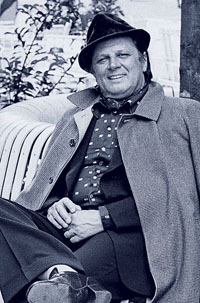
Gianni Raimondi was an Italian lyric tenor, particularly associated with the Italian repertory.
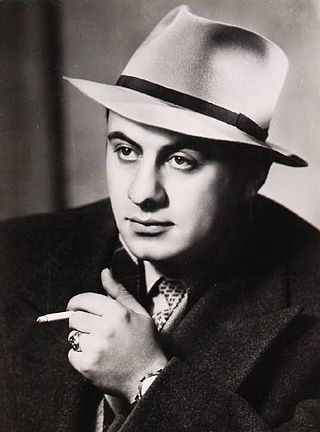
Raffaele Arié was a Bulgarian bass, particularly associated with the Italian and Russian repertories who was born in Sofia and died in Switzerland.

Mirto Picchi was an Italian dramatic tenor, particularly associated with the Italian repertory, and with contemporary works.
Georges Sébastian was a French conductor of Hungarian birth, particularly associated with Wagner and the post-romantic repertory. He was born in Budapest and died in La Hauteville.
This is a discography of Tosca, an opera by Giacomo Puccini. It premiered at the Teatro Costanzi in Rome on 14 January 1900. Tosca has been one of the most frequently recorded operas, dating back to a nearly complete acoustical recording in 1918.

Peter Edward Andry, was a classical record producer and an influential executive in the recording industry, active from the 1950s to the 1990s.
Franco Calabrese was an Italian bass singer.

Before Him All Rome Trembled is a 1946 Italian musical war melodrama film directed by Carmine Gallone and starring Anna Magnani, Tito Gobbi and Hans Hinrich. Ada and Marco are a pair of opera singers, who moonlight working for the Italian resistance at the time of the German occupation of Rome during the Second World War. They are sheltering a British soldier with whom they make contact with the advancing Allied forces. Sylistically the film is a hybrid between filmed performances of opera, and a neorealistic resistance melodrama.
Melchiorre Luise was a leading exponent of the operatic basso buffo repertoire.

Antonio Salvarezza was an Italian tenor.
